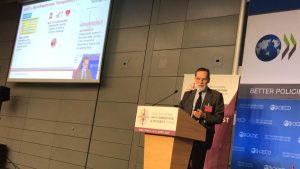More than 40% of the world’s population currently live in water-stressed river basins, and demand is set to rise by 55% by 2050. This World Water Day, CoST has been considering how greater transparency and accountability in water infrastructure projects can ensure the world’s ever growing demands for the resource are met.
Technical Adviser Hamish Goldie-Scot spoke on this topic yesterday at the OECD Integrity Forum, where he shared a stage with colleagues from the Open Government Partnership, Water Integrity Network and SUEZ. The forum’s focus this year was on the risks and opportunities for anti-corruption and integrity posed by new technologies, and panellists at this session examined  the social and technological innovations available to promote integrity in water.
the social and technological innovations available to promote integrity in water.
Hamish emphasised the need to build trust to strengthen performance in water infrastructure procurement and showed how the CoST approach not only helps address this, but also serves to strengthen existing accountability mechanisms. As such, it contributes to improved performance not just within projects, but potentially – as assurance report recommendations are adopted – at sector level. Hamish also said:
“It is important to define the root problem that CoST is trying to address. It is not “corruption” as such, but that fact that a combination of inefficiency, mismanagement and corruption is undermining performance in infrastructure procurement…’good performance’ means the right infrastructure being delivered on time to the specified quality and at a cost that is not inflated through any malpractice”
With regards to water and sanitation projects, these amounted to around 10% of the projects included in the CoST assurance process between 2016-2018 and included projects in diverse settings, from irrigation works in Ethiopia, water supply and distribution projects in Malawi, dam construction in Afghanistan and sanitary sewer systems in Guatemala. In Malawi, our assurance process showed the importance of a fair, open and competitive bidding process in the extension of a water treatment works in Lilongwe. Having such a process in place led to the project being delivered efficiently and with a cost saving of US$5,920.
The construction of the Malomo Water Supply in the district of Ntchisi also taught us key lessons, including the need for a supervision team on site to assure that construction is timely and efficient. Having this in place, alongside a similarly competitive bidding process, meant that the project recorded just a 4% price variation and relatively low time overrun of 14%: the assurance team in Malawi stated this was one of the most successfully implemented projects in the country in 2016. This contrasts with water projects in Guatemala, where a lack of planning and preparation lead to an adverse impact in project delivery, and in some cases time overruns of as high as 300%.
When the right processes are in place, we can ensure water projects are correctly planned, funded and efficiently delivered. Furthermore, by asking for data on water projects to be disclosed at each stage of the project cycle (from inception to completion), opportunities for corruption are diminished. This also allows the public easy access to the data themselves and empowers them to hold decision-makers to account. It is only with factors like this that we can ensure demand for water is not only met but done so in a way which serves and benefits the wider community.
Watch Hamish’s presentation at the OECD Integrity Forum here (from 6:00)
